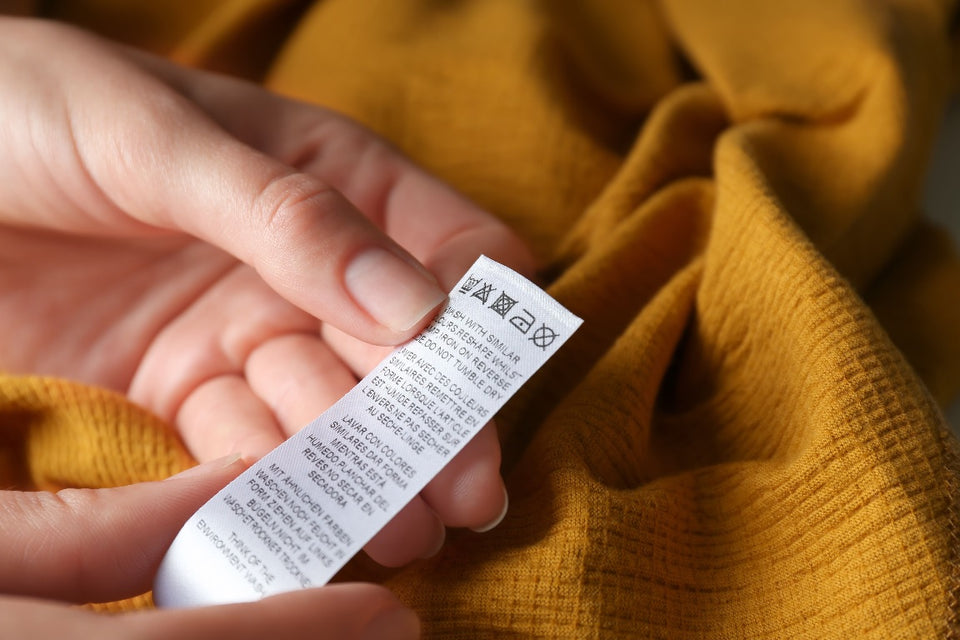The first step in stopping clothes from fading is to identify what caused the problem. Let’s explore the reasons clothes fade fast and how to keep the colours for longer.
Are you tired of seeing your favourite clothes fade over time? Whether it's a designer blouse or a vintage dress, preventing your favourite clothes from fading is a top priority.
The best way to ensure that your garments retain their brilliant colours is to understand the fading process and put preventive measures in place.
Let’s explore the reasons clothes fade first.
What causes clothes to fade?
What happens when you buy a new pair of stylish pants only to discover that they have begun to fade after a couple of washes? That may be okay if you are going for a distressed look, but otherwise, it’s a problem you need to solve.
The first step in stopping clothes from fading is to identify what caused the problem.
Manufacturers use dyes and pigment compounds to create fabric colours. While washing, some pigments or dyes can lose their molecular connection with the fabric fibres. This causes the dyes in coloured clothing to fade.
Which clothes fade the fastest and why?
Dark-coloured clothes fade more quickly than lighter colours because they contain more dye. These dyes break down over time, causing the items to lose their vibrant colour and richness. Several factors, including the fabric of a garment, can affect how quickly it fades.
Plant and animal-derived textiles, such as cotton, wool, and silk, are more prone to fading than synthetic materials, such as polyester, which contain chemicals that hold dye better than other fibres.
Sunlight, heat, and washing all contribute to fading dark and black clothes. Sunlight, particularly UV radiation, can cause the colour molecules in the fabrics to break down. The heat from sources such as warm water, the dryer, or ironing can also cause fading since high temperatures speed the breakdown of the dye.
Washing dark clothes with harsh chemicals can also speed up the fading process by removing the colour molecules from the dark fabrics.
13 Top Tips to Keep Clothes from Fading
Always Follow Clothing Label Instructions
The most important thing to remember while washing garments is to always follow the care label from the manufacturer. Every fabric includes a tag that includes laundry symbols, which indicate whether an item should be dry cleaned only, washed in cold water, air dried, etc.

Following the directions listed on the care label will provide the proper care for your garment and help prevent fading.
Turn Clothes Inside Out
No matter how carefully you wash your clothes, they can be damaged during the washing process. But turning garments inside out before washing them is one of the simplest ways to avoid colour loss. They will still get clean, but friction on the outside of your clothes will be reduced.
Another way to prevent damage is to zip up all zippers before washing, which also reduces friction and prevents snagging.
Wash Clothes in Cold Water
When washing clothes using a washing machine, it’s always best to select a cold water cycle since hot water can cause colours to bleed and fade. It was once a common myth that using hot water would allow detergents to dissolve faster and clean your clothes better. But modern detergents are formulated to work best in cold water.
Use a Gentle Detergent
Choose a detergent that is gentle yet effective. There are many detergents on the market that are made with harsh chemicals that, while effective in removing dirt and stains, can harm your clothing, especially those made of delicate fabrics.
So it is essential to avoid these harsh detergents and opt for a detergent that has gentle ingredients. The gentler the detergent, the greater the likelihood that your garments will retain their colour.
Use a Fabric Conditioner
Using a fabric conditioner can help keep your garments in good condition for a longer period of time. A fabric conditioner adds strength, lubrication, and moisture to your clothing’s fibres. This lowers friction during washing and ensures that the clothing does not easily wear and tear, resulting in less fading.
Avoid Overloading the Washing Machine
Laundry is an endless and monotonous chore, and it is natural to want to wash as many items as possible in each load. But over-stuffing your washing machine causes greater friction between your garments.
This causes the molecules in the clothes to break, resulting in fading. It also increases the likelihood that your garments will not be fully washed or rinsed, so make sure your machine is full but not overloaded.
Wash Dark and Light-Coloured Clothes Separately
Always wash dark-coloured items in a separate load from white and other light-coloured clothes. Washing them together could cause dark-coloured garments to discolour and leave marks on lighter-coloured ones.
One of the best ways to ensure your clothes’ safety is to wash whites, light colours, and dark colours in separate loads. This method prevents color transfer from ruining your clothes.
Avoid Using the Dryer
A dryer is certainly the fastest way to dry your clothing, but it is not the best. Using a dryer can alter the texture of your clothing and cause colors to fade. Always air dry clothing whenever possible
Keep Clothes Away from the Sun

The sun's UV radiation is another major contributor to fading. When hanging your items to dry outside, find a shady spot with plenty of air circulation. You'll still enjoy the benefits of air drying while avoiding the bleaching effects of direct sunshine.
Check for Colourfastness
Always check for colourfastness, a fabric's ability to hold its dyes without fading or bleeding, before washing an item for the first time. Rub a moist cotton swab along an internal seam or hem to see if any colour transfers to the swab. If it does, wash the item separately or with matching colours.
Wash Before Wearing
Dye does not only come off in the wash; it may also rub off on your skin and furniture. To avoid dye stains or residues, be sure to test for colourfastness and wash new items before wearing them.
Choose a Gentle Wash Cycle
Because avoiding friction is essential for keeping your garments bright and vibrant, select a gentle cycle wherever possible. And, if the garment is very delicate, hand wash for best results.
Do Not Wash Your Clothes Unnecessarily
The need to wash your garments after each use is real and understandable. However, if you have only worn an item for a very short period of time and have not gotten it dirty or sweaty, it is not advisable to wash it.
Washing your garments too often causes the molecular bonds to weaken and break, resulting in discoloration. So only wash your clothing if you've worn them all day or if they're dirty or stained.
Do vinegar and salt stop clothes from fading?
Vinegar and salt have been advertised as miracle workers for preventing fading, especially for dark clothing. The truth is that they may help but there are no guarantees.
Half of a cup of white vinegar added to the rinse cycle may help dissolve any remaining soap residue which could affect the colour of your garments. Also, the acidity of vinegar can help seal the colour of your clothing, avoiding fading over time.
Soaking a heavily dyed garment in a salt-water solution can help seal the item’s colour. Another option is to add a salt-water solution directly into your washing machine before starting the cycle.

It's important to mention that the experts are divided on the ability of salt and vinegar to prevent fading. But even if these substances don’t completely prevent fading, they will help extend the life of your garments, especially the ones with dark colours.
FAQs
How do you keep clothes from fading and shrinking?
To prevent fading and shrinking, sort your laundry by colour and wash similarly coloured items together, turn your garments inside out, and avoid overloading the washer. You should also use a gentle detergent that is appropriate for the type of fabric being washed. To minimise shrinking, air drying is preferred, but if you must use a dryer, select a low heat setting.
How do you keep black and dark-coloured clothes from fading?
To maintain the colour of black and dark-coloured clothing, use a detergent formulated particularly for dark garments. These detergents are formulated to maintain color vibrancy. We also recommend washing dark-coloured clothing separately and keeping clothing away from direct sunlight.
How do you keep black clothes black?
To keep your black garments black, wash them less frequently to limit detergent exposure and agitation. When washing, use a gentle detergent designed particularly for dark items, since traditional detergents might remove colour. Additionally, store black garments in a cool, dark space away from sunlight, as UV rays can cause fading over time.
How do you revive faded clothes?
To bring back the radiance of faded garments, start by washing them in cold water with a gentle detergent recommended for delicate textiles. A cup of white vinegar added to the rinse cycle can aid in the removal of built-up residue and the restoration of colour. Another alternative is to use a color-boosting washing detergent or a colour-reviving dye made particularly for faded clothing.

As mentioned, one way to prevent dark clothing from fading is to store it in a cool, dark space away from sunlight. We recommend storing your most treasured garments in high-quality storage bags when not in regular use. Hayden Hill bags offer your most treasured items superior protection from fading and more. Made of breathable cotton, our bags protect clothing from dust, light, moths, mould, and condensation.








